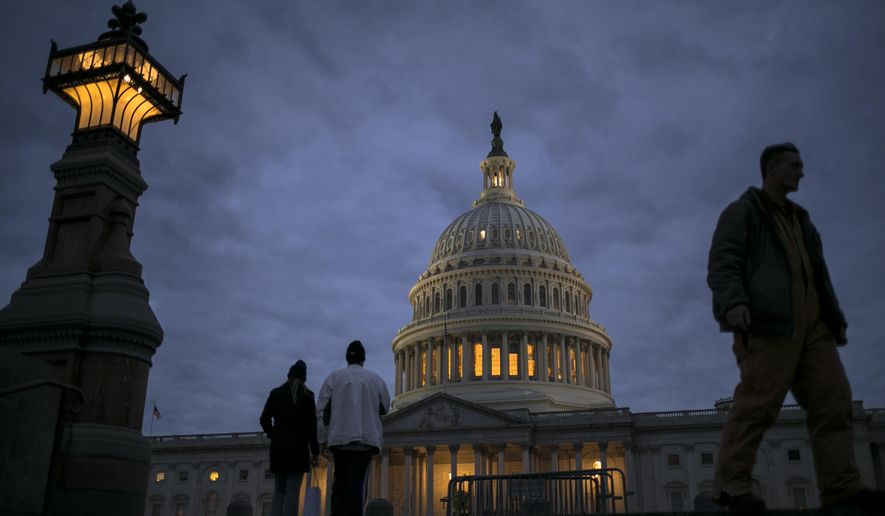The House voted Tuesday to avert another government shutdown, approving a bill to fund the military for the rest of the year and domestic operations for six more weeks, as all sides sounded optimistic about a broader deal.
The 245-182 vote sends the bill to the Senate, where Democratic leaders had said it was iffy — but said they were encouraged by ongoing talks on a two-year budget deal that would solve most of the spending fight that’s bedeviled Congress since December.
Something must pass by Thursday, or the government will fall into its second shutdown in weeks, after a three-day stoppage ensued last month.
The current bill includes $659 billion for a full year’s worth of spending for the Defense Department and a two-year extension for community health centers and emergency money for disaster loans to small businesses.
The military money was meant to entice conservatives fed up with the reality of a fiscal year that is already four months old, forcing the Pentagon to limp along on stopgap money.
“Nothing is more important for Congress than for us to do our job to support the men and women who protect us, fully and unconditionally,” said Rep. Mac Thornberry, chairman of the House Armed Services Committee.
The health centers extension was intended to win over Democratic support, but they were reticent, saying the GOP has bungled the spending process this whole year.
“The Republicans control the House, the Senate, and the White House, yet they are pressing forward on their fifth stopgap short-term spending bill, demonstrating their failure to govern,” said House Minority Leader Nancy Pelosi.
The tough talk on the chamber floor masked negotiations behind closed doors, where leaders were working toward a long-sought deal to lift the strict spending caps that are designed to constrain both domestic and military spending.
Senate Majority Leader Mitch McConnell and his Democratic counterpart, Sen. Charles E. Schumer, said they were optimistic they could reach an agreement that would reportedly boost spending by about $300 billion over two years.
Mr. Schumer also said the budget deal could involve an increase in the debt ceiling, after Congress’s scorekeeper issued a fresh warning that the Treasury Department might run out of cash to cover the country’s bills during the first half of March.
But support among the rank-and-file of both parties for such a massive deal is still anything but certain.
Rep. Mark Meadows, a leading House conservative, said he would support an additional $80 billion for defense spending over a year, but that a reported $63 billion in additional domestic spending would be a “problem.”
Mr. Meadows estimated that Democrats would have to provide somewhere around 100 of the votes to get such a deal through the House if it also involved a hike in the debt ceiling, which is always a thorny subject among conservatives.
Rep. Scott Perry said he backs the full-year funding for the military, but that lawmakers have to find ways to rein in spending.
“We got to do something about spending — we have to … can’t just keep on increasing the debt ceiling and acting like there’s nothing on the other side of the ledger that needs to change,” said Mr. Perry, Pennsylvania Republican.
But some liberal Democrats also want their leaders to keep pressing the issue on new protections for young illegal immigrant “dreamers” — an issue Republican leaders say needs to be separated from the budget discussion.
President Trump also inserted a new demand into the sensitive talks on Tuesday, calling for another shutdown if lawmakers don’t pass new border security measures as part of an immigration deal.
“If we have to shut it down because the Democrats don’t want safety … then shut it down,” Mr. Trump said.
White House press secretary Sarah Huckabee Sanders said later that the president isn’t advocating a shutdown, but that he would welcome the fight if Democrats try to push the envelope.
• S.A. Miller can be reached at smiller@washingtontimes.com.
• David Sherfinski can be reached at dsherfinski@washingtontimes.com.




Please read our comment policy before commenting.